New U.S. coach Gregg Berhalter announced an intriguing position change after his first training session with the full American player pool Monday, moving Tyler Adams to right back and DeAndre Yedlin to wide midfield.
Yedlin, at 25, is among the veterans retained after the failure to qualify for last year's World Cup. He has been primarily a right back for the national team and Newcastle in England.
Adams, a 20-year-old who made his debut under interim coach Dave Sarachan in November 2017, has been a central midfielder for the national team, the New York Red Bulls and now RB Leipzig in Germany.

FILE - In this Oct. 11, 2018, file photo, United States' DeAndre Yedlin (2) moves the ball against Colombia during the second half of an international friendly soccer match in Tampa, Fla. New U.S. coach Gregg Berhalter announced a surprising position change after his first training session with the full American player pool, shifting Tyler Adams to right back and Yedlin to wide midfield. (AP PhotoJohn Raoux, File)
"This is the beginning phases and we want to test it and we want to see how it looks and we want to see how he adapts and what it gives our team overall," Berhalter said.
Preparing for the CONCACAF Gold Cup in June, the Americans play exhibitions against Ecuador on Thursday in Orlando and Chile next week in Houston.
Berhalter was hired in December, the fourth American coach in just over two years, and led the U.S. to wins over Panama and Costa Rica using a roster exclusively from Major League Soccer. Europe-based players joined the team this week.
Berhalter was active during the training session on a wind-swept field adjacent to a hotel golf course, shouting instructions. Two white boards with player positions were on the grass by the touchlines.
"Obviously he's a tactician and have great faith that obviously he really knows what he's doing," Yedlin said. "Just being out here one day with him, there's a lot of details, especially on the tactical side."
One of the puzzles Berhalter must solve is how to get the team's three 20-year-old midfielders on the field at the same time in effective positions: Adams, Weston McKennie and Christian Pulisic. Michael Bradley (31) and Wil Trapp (26) seem likely to share time as a holding midfielder in a 4-1-2-3 formation.
"This is the beginning phases and we want to test it and we want to see how it looks," Berhalter said. "When you're looking at a profile of Michael Bradley or Will Trapp, a very controlling player, and you have the dynamic guy next to him in Tyler who can come inside and still be influential from that position, we think it's exciting and we want to take a look at it. It may not work exactly how we have planned and we'll have to adapt. But I think in theory it's something worth trying."
Yedlin's role will be up and down the right wing.
"He's not going to be in the back. He's going to be forward at the top of the penalty box or he's going to be combining in wide areas. And that's right in his skill set," Berhalter said. "We're not going to ask him to do things he's not comfortable with. We'll adapt to him to a certain extent. I'm watching all of his games and what I see with him is a tremendous ability to build momentum from behind with his speed to take advantage of underlaps or interlap situations. He has a good cross."
Adams earned a starting job in the Bundesliga soon after his arrival in January and fits into Berhalter's ball-control tactics.
"His capacity is huge. His speed is huge. His quickness is very good," Berhalter said. "And what I like now that he's doing at Red Bull is he's taking the ball and he's penetrating with the ball and he's trying to break lines with the ball dribbling, and then as passes open up, as he's closed down, he's able to find that pass between the lines. And that's been a new element to his game."
Berhalter plans to use Pulisic as an attacking central midfielder, tilted left. McKennie, also with a central role, impressed Berhalter when the coach attended the first leg of Schalke's Champions League quarterfinal against Manchester City.
"He didn't lose a header. Every single header he's going up, he's winning, against some big, strong guys," Berhalter said. "And then his ability to run behind the line and get in the penalty box was excellent."
NOTES: Berhalter said there is no long-term significance to his omitting 34-year-old goalkeeper Brad Guzan, the backup to Tim Howard at the last World Cup. "I called Brad and talked to him and it's about evaluating other players," Berhalter said. "Everyone knows what Brad can do." ... Bradley, D Tim Ream and GK Ethan Horvath missed practice while traveling and were due to join training Tuesday. ... The U.S. under-23 team is training in Spain this week.
More AP soccer: https://apnews.com/apf-Soccer and https://twitter.com/AP_Sports
UNITED NATIONS (AP) — The United States vetoed a widely backed U.N. resolution Thursday that would have paved the way for full United Nations membership for Palestine, a goal the Palestinians have long sought and Israel has worked to prevent.
The vote in the 15-member Security Council was 12 in favor, the United States opposed and two abstentions, from the United Kingdom and Switzerland. U.S. allies France, Japan and South Korea supported the resolution.
The strong support the Palestinians received reflects not only the growing number of countries recognizing their statehood but almost certainly the global support for Palestinians facing a humanitarian crisis caused by the war in Gaza, now in its seventh month.
The resolution would have recommended that the 193-member U.N. General Assembly, where there are no vetoes, approve Palestine becoming the 194th member of the United Nations. Some 140 countries have already recognized Palestine, so its admission would have been approved, likely by a much higher number of countries.
U.S. deputy ambassador Robert Wood told the Security Council that the veto “does not reflect opposition to Palestinian statehood but instead is an acknowledgment that it will only come from direct negotiations between the parties."
The United States has “been very clear consistently that premature actions in New York — even with the best intentions — will not achieve statehood for the Palestinian people,” deputy State Department spokesman Vedant Patel said.
His voice breaking at times, Palestinian U.N. Ambassador Riyad Mansour told the council after the vote: “The fact that this resolution did not pass will not break our will and it will not defeat our determination.”
“We will not stop in our effort,” he said. “The state of Palestine is inevitable. It is real. Perhaps they see it as far away, but we see it as near.”
This is the second Palestinian attempt for full membership and comes as the war in Gaza has put the more than 75-year-old Israeli-Palestinian conflict at center stage.
Palestinian President Mahmoud Abbas first delivered the Palestinian Authority’s application for U.N. membership in 2011. It failed because the Palestinians didn’t get the required minimum support of nine of the Security Council’s 15 members.
They went to the General Assembly and succeeded by more than a two-thirds majority in having their status raised from a U.N. observer to a non-member observer state in 2012. That opened the door for the Palestinian territories to join U.N. and other international organizations, including the International Criminal Court.
Algerian U.N. Ambassador Amar Bendjama, the Arab representative on the council who introduced the resolution, called Palestine’s admission “a critical step toward rectifying a longstanding injustice" and said that “peace will come from Palestine’s inclusion, not from its exclusion.”
In explaining the U.S. veto, Wood said there are “unresolved questions” on whether Palestine meets the criteria to be considered a state. He pointed to Hamas still exerting power and influence in the Gaza Strip, which is a key part of the state envisioned by the Palestinians.
Wood stressed that the U.S. commitment to a two-state solution, where Israel and Palestine live side-by-side in peace, is the only path for security for both sides and for Israel to establish relations with all its Arab neighbors, including Saudi Arabia.
“The United States is committed to intensifying its engagement with the Palestinians and the rest of the region, not only to address the current crisis in Gaza, but to advance a political settlement that will create a path to Palestinian statehood and membership in the United Nations,” he said.
Mansour, the Palestinian U.N. ambassador, reiterated the commitment to a two-state solution but asserted that Israel believes Palestine "is a permanent strategic threat."
"Israel will do its best to block the sovereignty of a Palestinian state and to make sure that the Palestinian people are exiled away from their homeland or remain under its occupation forever,” he said.
He demanded of the council and diplomats crowded in the chamber: “What will the international community do? What will you do?”
Israeli-Palestinian negotiations have been stalled for years, and Israel’s right-wing government is dominated by hard-liners who oppose Palestinian statehood.
Israeli U.N. Ambassador Gilad Erdan called the resolution “disconnected to the reality on the ground” and warned that it “will cause only destruction for years to come and harm any chance for future dialogue.”
Six months after the Oct. 7 attack by the Hamas militant group, which controlled Gaza, and the killing of 1,200 people in “the most brutal massacre of Jews since the Holocaust,” he accused the Security Council of seeking “to reward the perpetrators of these atrocities with statehood.”
Israel’s military offensive in response has killed over 32,000 Palestinians, according to Gaza’s health ministry, and destroyed much of the territory, which speaker after speaker denounced Thursday.
After the vote, Erdan thanked the United States and particularly President Joe Biden “for standing up for truth and morality in the face of hypocrisy and politics.”
He called the Palestinian Authority — which controls the West Bank and the U.S. wants to see take over Gaza where Hamas still has sway — “a terror supporting entity.”
The Israeli U.N. ambassador referred to the requirements for U.N. membership – accepting the obligations in the U.N. Charter and being a “peace-loving” state.
“How can you say seriously that the Palestinians are peace loving? How?” Erdan asked. “The Palestinians are paying terrorists, paying them to slaughter us. None of their leaders condemns terrorism, nor the Oct. 7 massacre. They call Hamas their brothers.”
Despite the Palestinian failure to meet the criteria for U.N. membership, Erdan said most council members supported it.
“It’s very sad because your vote will only embolden Palestinian rejectionism every more and make peace almost impossible,” he said.
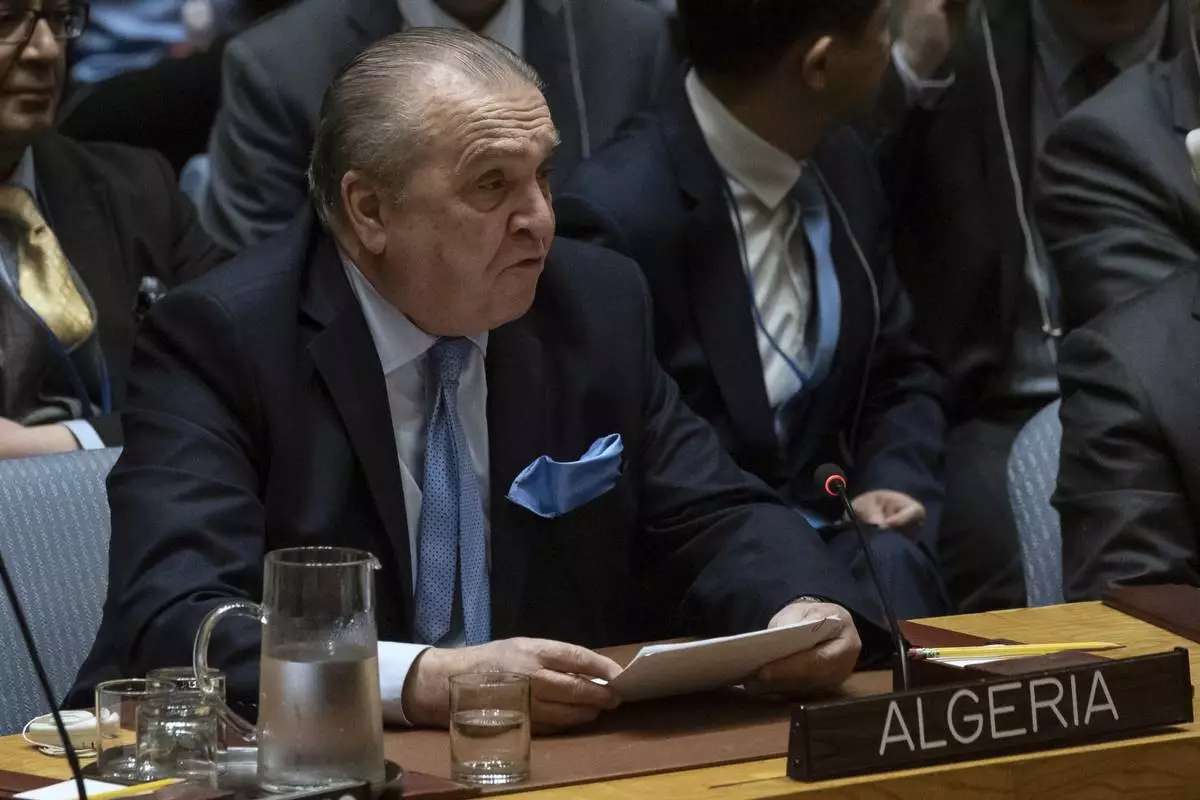
Algeria's Permanent Ambassador to the United Nations Amar Bendjama speaks during a Security Council meeting at United Nations headquarters, Thursday, April 18, 2024. (AP Photo/Yuki Iwamura)
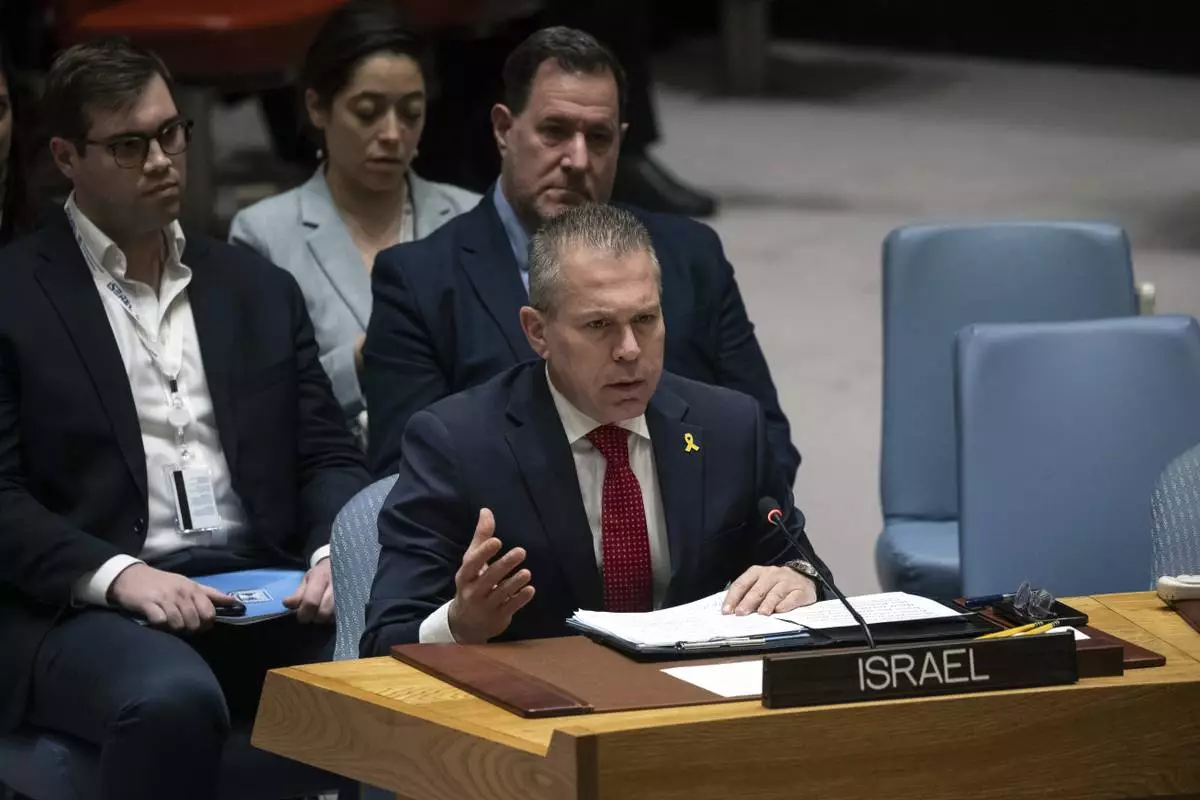
Israeli Ambassador to the United Nations Gilad Erdan speaks during a Security Council meeting at United Nations headquarters, Thursday, April 18, 2024. (AP Photo/Yuki Iwamura)
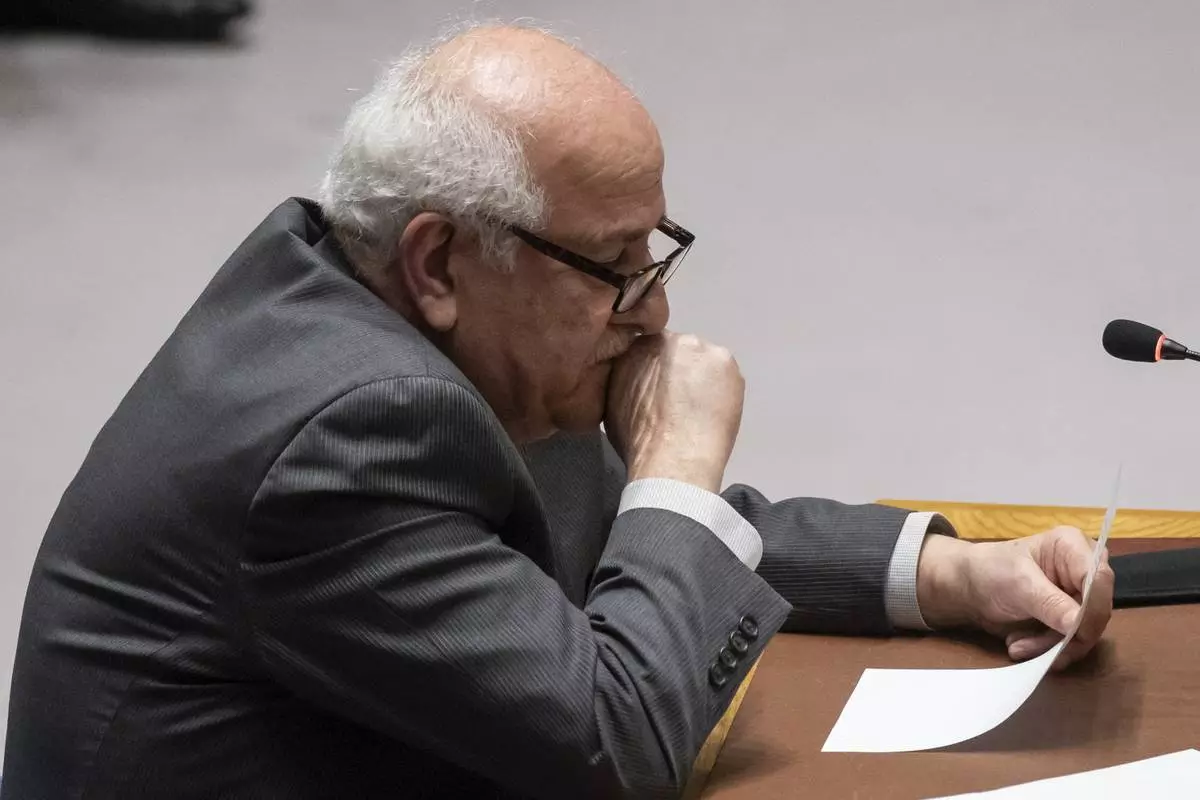
Palestinian Ambassador to the United Nations Riyad Mansour holds tears while speaking during a Security Council meeting at United Nations headquarters, Thursday, April 18, 2024. (AP Photo/Yuki Iwamura)
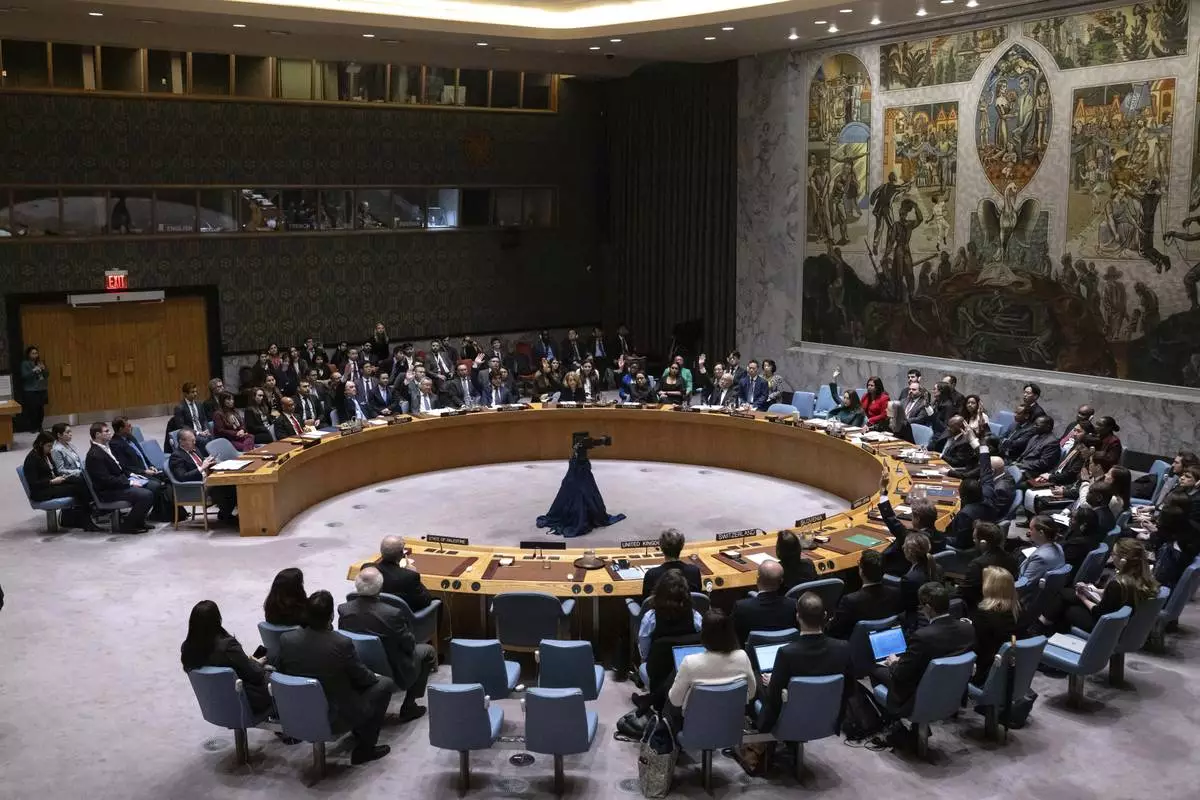
Representatives of member countries take votes during a Security Council meeting at United Nations headquarters, Thursday, April 18, 2024. (AP Photo/Yuki Iwamura)
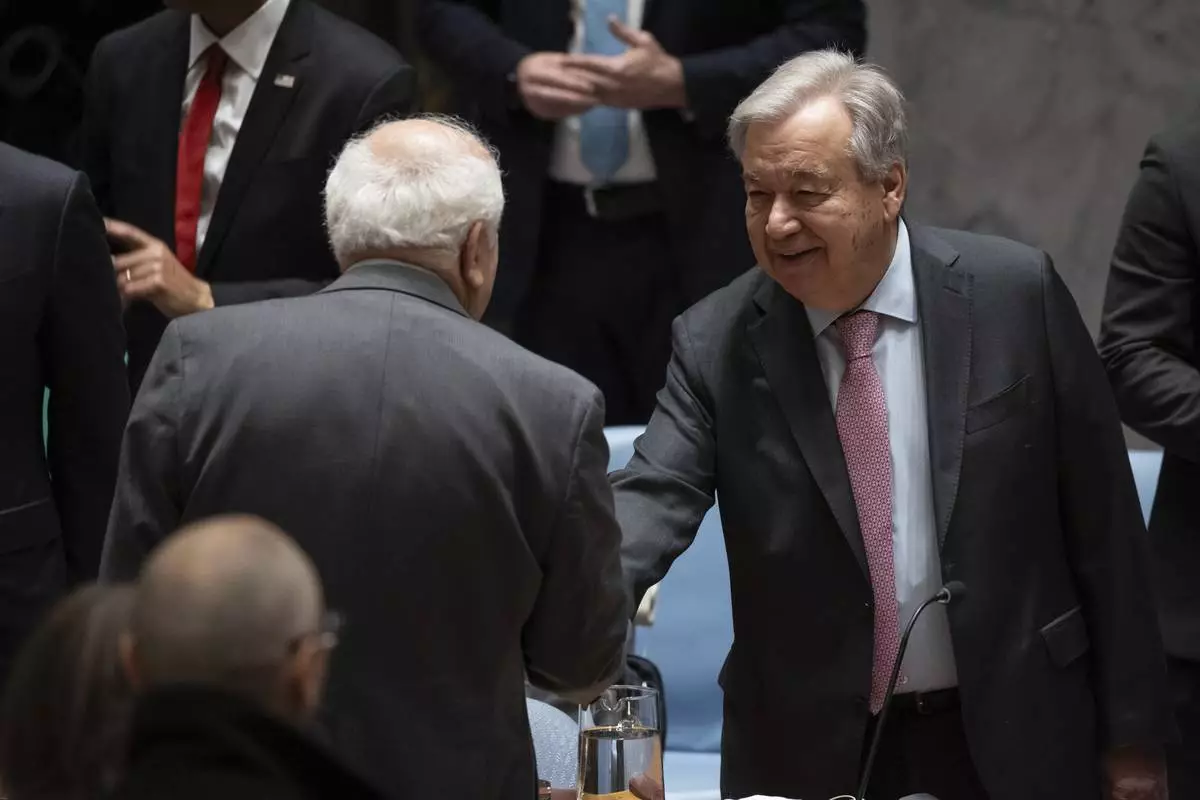
Palestinian Ambassador to the United Nations Riyad Mansour, left, and United Nations Secretary-General Antonio Guterres speak before a Security Council meeting at the United Nations headquarters, Thursday, April 18, 2024. (AP Photo/Yuki Iwamura)
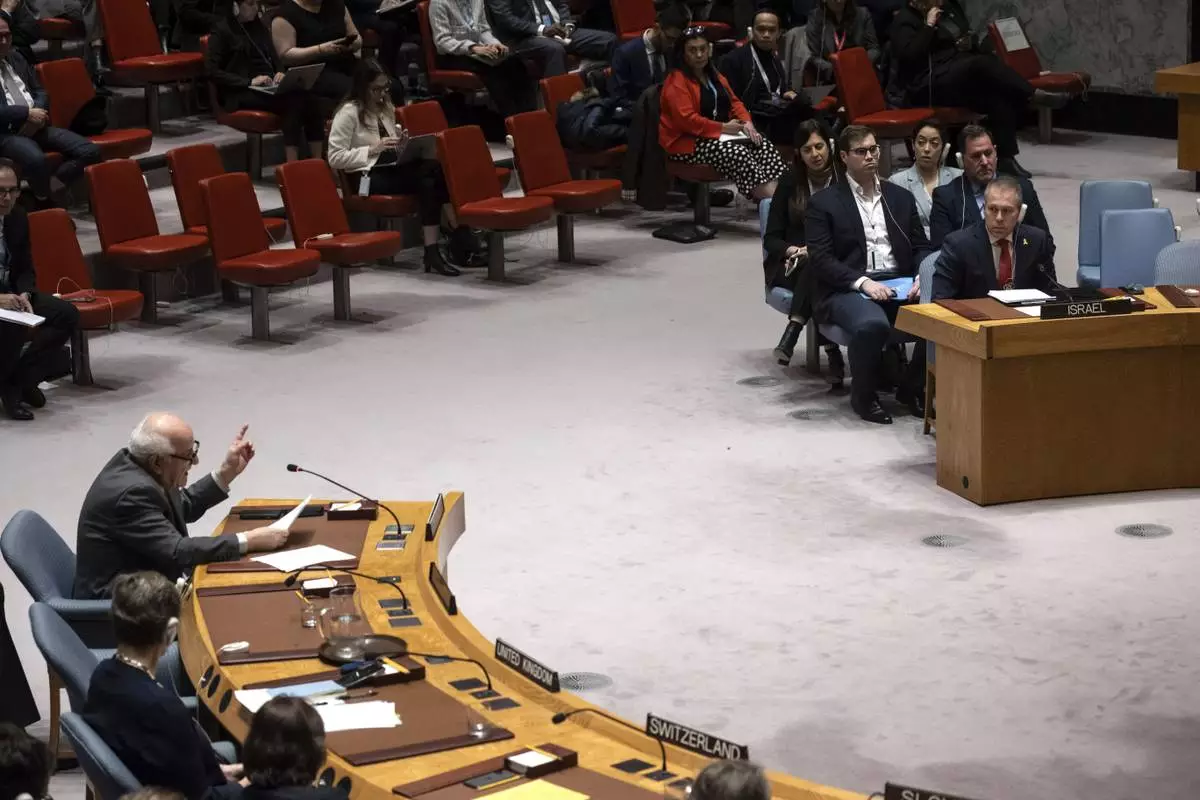
Palestinian Ambassador to the United Nations Riyad Mansour speaks during a Security Council meeting at United Nations headquarters, Thursday, April 18, 2024. (AP Photo/Yuki Iwamura)
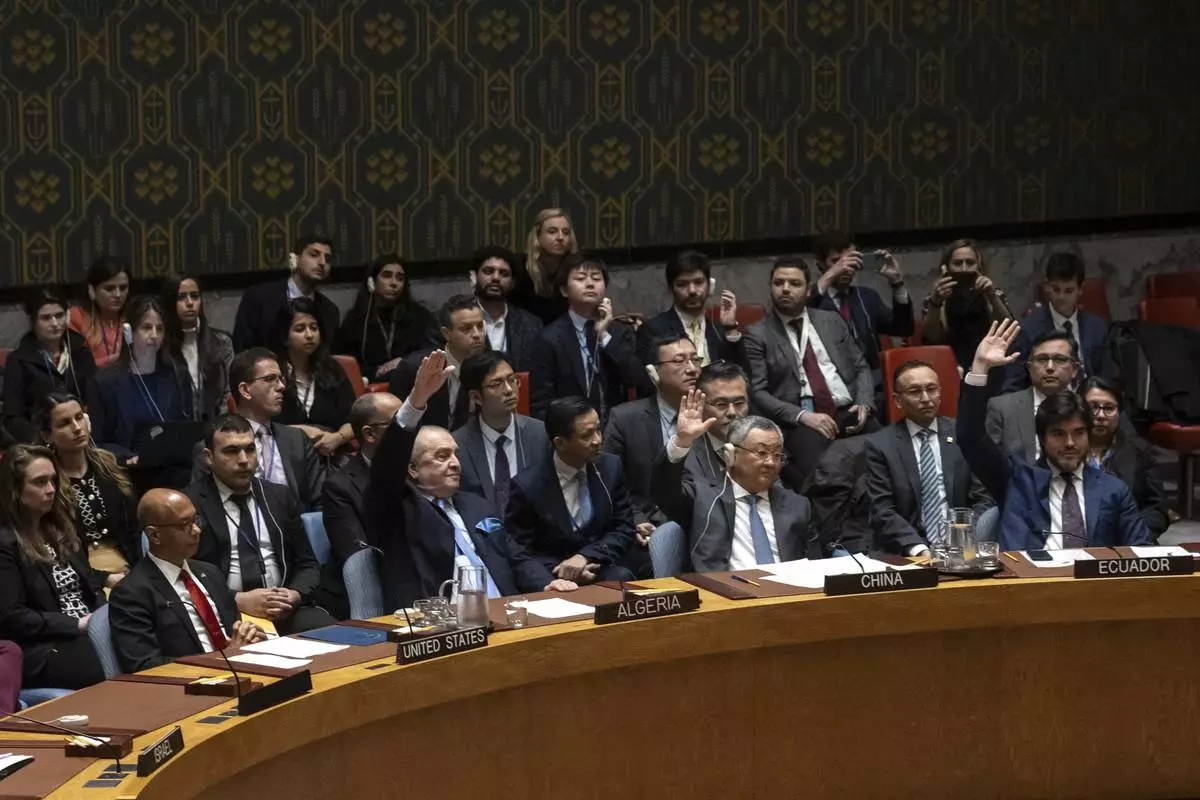
Representatives of member countries take votes during a Security Council meeting at United Nations headquarters, Thursday, April 18, 2024. (AP Photo/Yuki Iwamura)
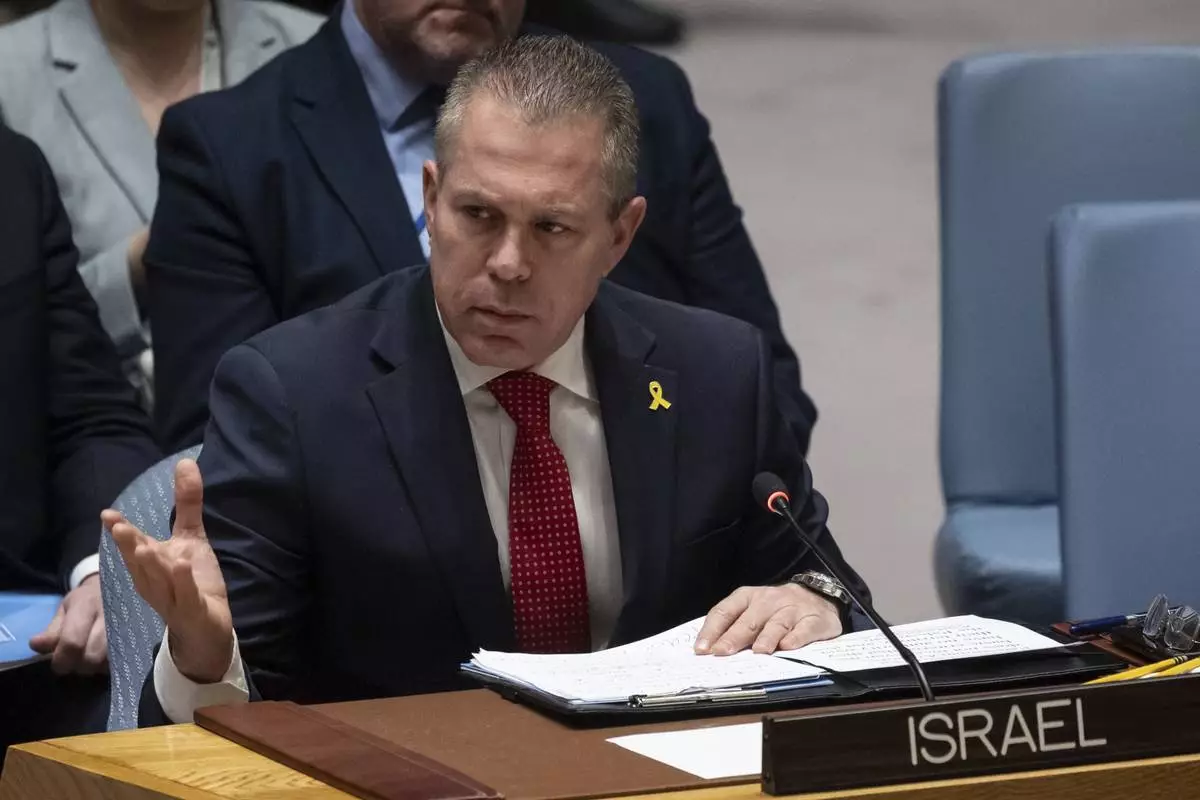
Israeli Ambassador to the United Nations Gilad Erdan speaks during a Security Council meeting at United Nations headquarters, Thursday, April 18, 2024. (AP Photo/Yuki Iwamura)
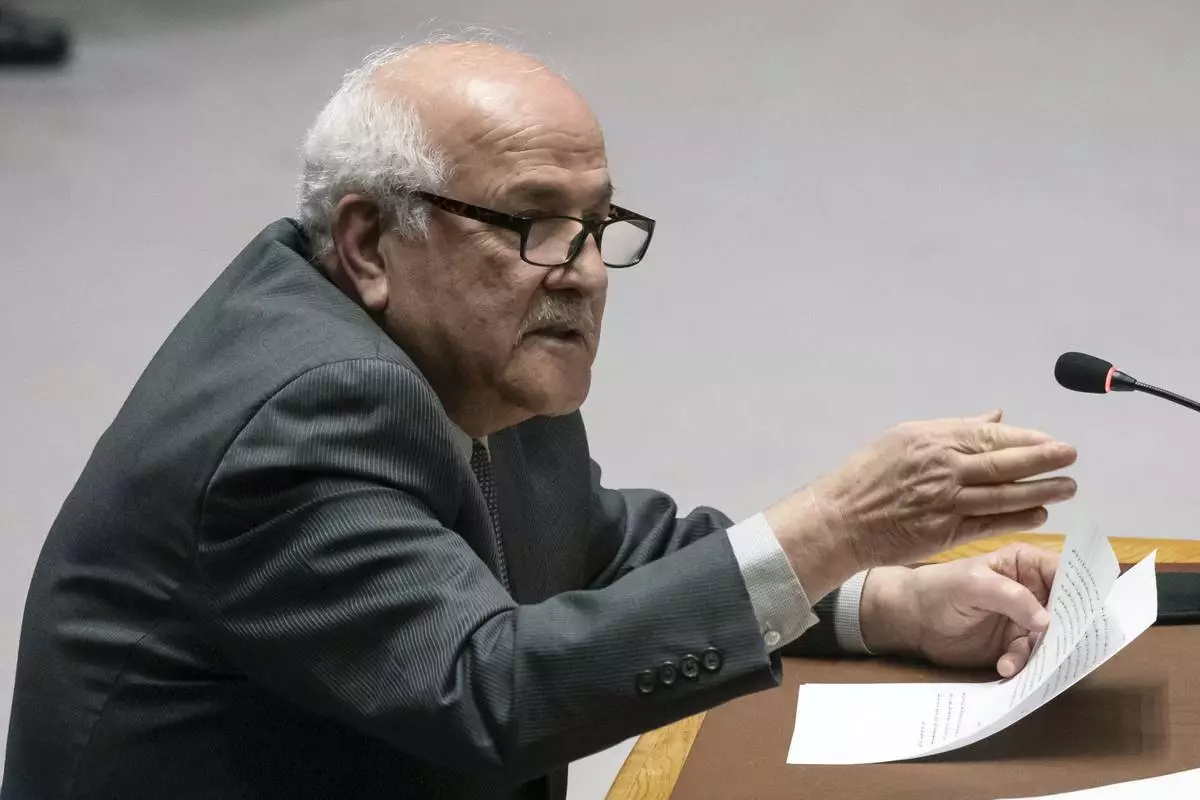
Palestinian Ambassador to the United Nations Riyad Mansour speaks during a Security Council meeting at United Nations headquarters, Thursday, April 18, 2024. (AP Photo/Yuki Iwamura)
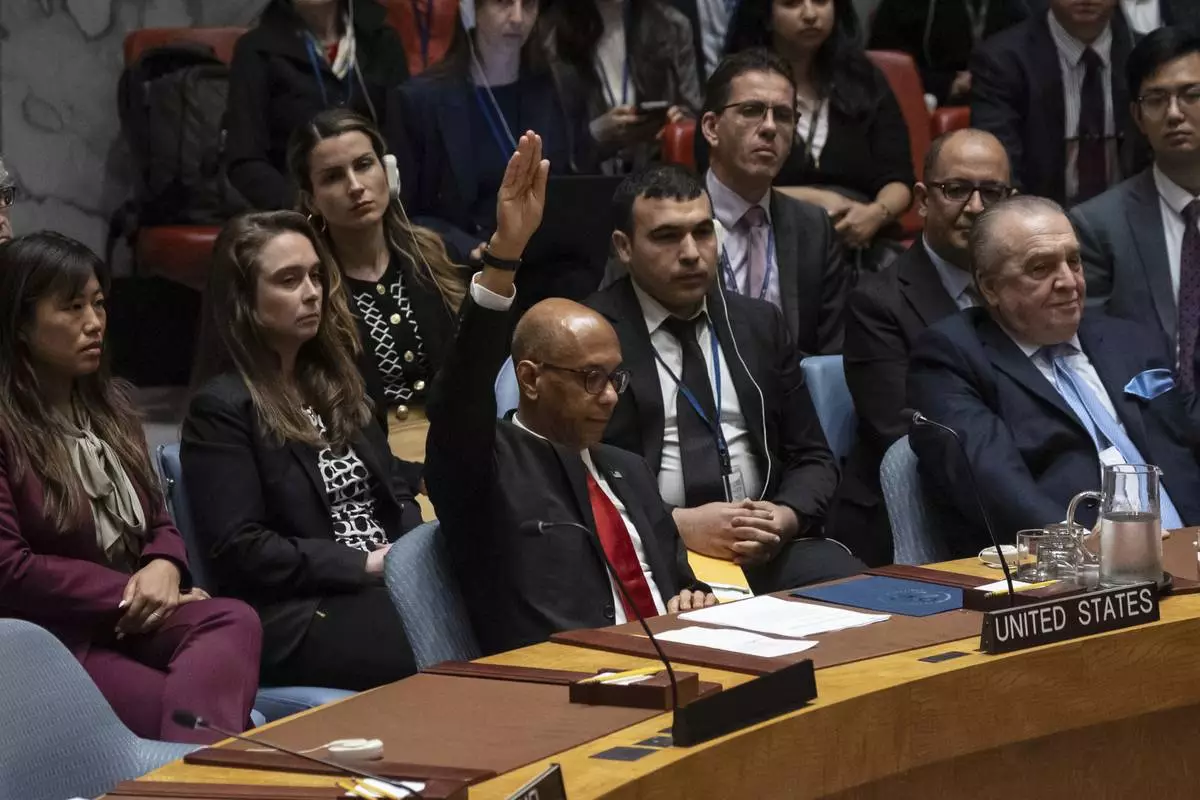
U.S. Deputy Ambassador Robert Wood votes against resolution during a Security Council meeting at United Nations headquarters, Thursday, April 18, 2024. (AP Photo/Yuki Iwamura)




















